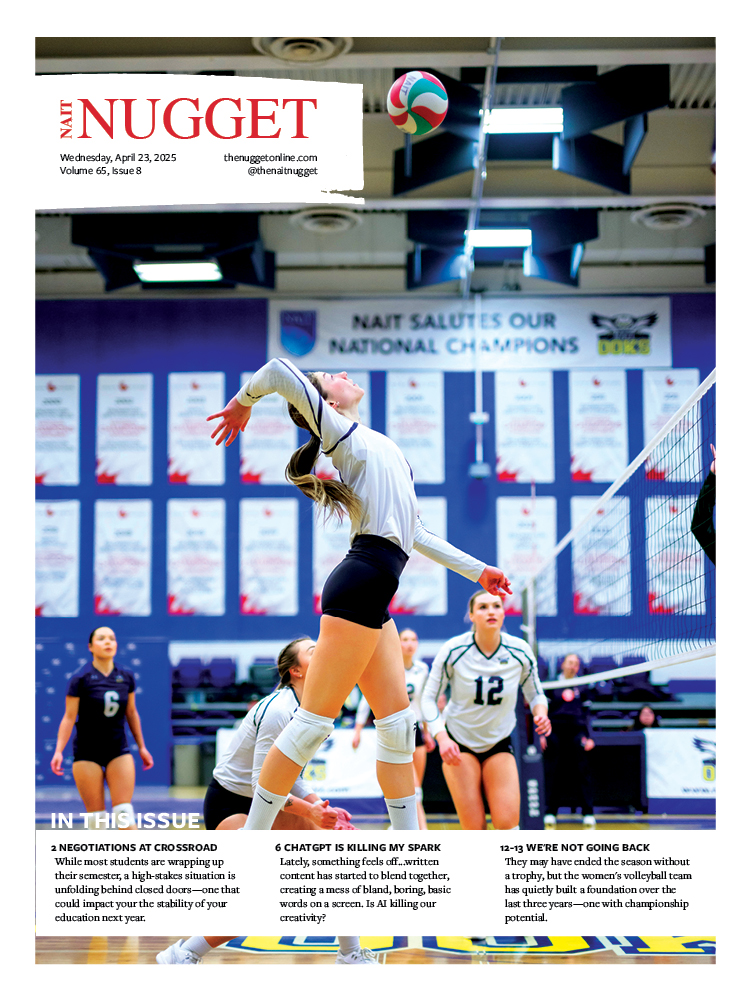A new study on campus set to be published next week is reporting that students are experiencing declining levels of the overall student experience at NAIT and higher levels of stress and anxiety.
The Idea Marketing Club conducted a student survey in December with the focus on the mental health of business students as a result of losing their usual midterm week. The fall semester was the first since the change of JR Shaw School of Business to the same exam schedule as the rest of NAIT.
“Just based on the general vibe within the business program, we thought we needed some quantifiable research to show how students were feeling,” said Belle Shaw, VP Communications, of the Idea Marketing Club.
“So we took on the mission of conducting some primary research into the subject and it just exploded.”
The survey was structured as a series of multiple choice questions concerning the student experience with midterm week, scaled questions from 1-5 about well-being, and two written response questions.
Over 675 students completed the survey, distributed on social media and email, equating to roughly 25 per cent of the business school. However, Shaw added that since midterm week served as a makeshift reading break, its absence made the survey applicable to all the schools of NAIT, despite its original business focus.
Eighteen per cent of respondents were from different faculties of NAIT, and few, if any from another school.
Ninety per cent of students who replied to the survey wrote more than a one paragraph reply. Over 300 detailed in length how their “classroom experience was impacted” because of a lost midterm week, with 69 per cent saying their attendance was impacted without the exam week and 67 per cent having mentions of “stress.”
Seventy-three per cent of students said they were willing to adjust their schedule to accommodate a fall reading break. Sixty-seven per cent of those who answered said ‘yes’ to a fall reading break favoured beginning the fall semester a week earlier than ending it a week later.
Students also reported an overwhelming feeling of stress and anxiety, a decrease in their study skills and a negative impact on mental health. Nearly half of respondents said they were also worried about their instructors, noting longer turnaround times on their assignments. Shaw said they too were frustrated by the change.
“They [the teachers] were really upset by that. I think some faculty members wanted to help us out just to have something quantifiable to hand to NAIT to say ‘you should probably do something about this’,” said Shaw.
The quantity of longer responses has been eye-opening for the team, who pursued feedback because they say NAIT “lacked communication” about the removal of midterm week.
“There may have been a formal warning somewhere but I’m speaking for myself unequivocally, nobody heard about it. I didn’t know and I’m a pretty involved student in the business program, too. There may have been a warning but people didn’t hear about it,” said Shaw.
With lots of feedback reporting more mental health strain, the team’s call to action is “change at the administrative level of NAIT.”
“We really want people to talk to decision-makers about instilling another reading break and focus more on mental health – utilizing some of the resources NAIT has gotten in the last year.”
In Sept. 2017, the provincial government announced a three-year $495,000 mental health grant. Since then, the Nugget has confirmed that the funding from the grant has gone towards free fitness classes from January to March and an expanded pet therapy program.
The full results of their report will be published next Week when the club launches its website.
– Michael Menzies






